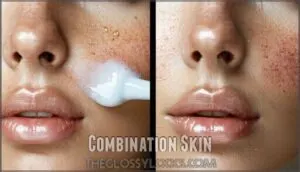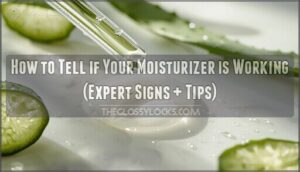This site is supported by our readers. We may earn a commission, at no cost to you, if you purchase through links.

You’ll want to avoid harsh sulfates, alcohol, and fragrances that strip your skin’s natural moisture barrier—like robbing a bank of its security system.
Opt for gentle, pH-balanced cleansers that clean without that tight, desert-dry feeling afterward. Cleansing balms and micellar waters work wonders for parched complexions.
Remember to use lukewarm water (not hot!) and pat—don’t rub—your face dry. The perfect cleanser isn’t just about cleaning; it’s about maintaining your skin’s delicate moisture balance.
Table Of Contents
- Key Takeaways
- How to Choose a Right Cleanser for Dry Skin?
- Understanding Your Skin Type
- Choosing a Cleanser for Dry Skin
- Additional Tips for Cleansing Dry Skin
- Frequently Asked Questions (FAQs)
- How to choose a face cleanser for dry skin?
- Which wash wash is best for dry skin?
- How do I know which cleanser to use?
- How do I choose skincare for dry skin?
- What cleanser should I use for dry skin?
- How to find the right cleanser for your face?
- What ingredients should I look for in a cleanser for dry skin?
- How do I know my skin type for cleanser?
- What is the best way to help dry skin?
- What should I look for in a cleanser for dry skin?
- Conclusion
Key Takeaways
- Look for cream or oil-based cleansers with hydrating ingredients like ceramides, hyaluronic acid, and glycerin to maintain your skin’s moisture barrier.
- Avoid harsh sulfates, alcohol, and fragrances that strip your skin’s natural oils, and opt for gentle, fragrance-free formulas that won’t cause irritation.
- Consider your specific dry skin concerns when selecting a cleanser—whether you’re dealing with sensitivity, makeup removal, or acne alongside dryness.
- Use lukewarm water instead of hot, pat (don’t rub) your face dry, and apply moisturizer immediately after cleansing while your skin is still slightly damp.
How to Choose a Right Cleanser for Dry Skin?
Choosing the perfect skin-saving cleanser for dry skin requires a thoughtful approach.
Choosing the right cleanser for dry skin unlocks hydration, comfort, and protection for your delicate moisture barrier.
Look for hydrating ingredients like ceramides, hyaluronic acid, and glycerin that won’t strip your moisture barrier.
Opt for gentle, fragrance-free formulas and consider cream or oil-based textures rather than foaming options.
Dermatologist-developed cleansers often provide the ideal hydration balance for sensitive, parched skin.
Squalene based cleansers can further hydrate and support the skin barrier.
Remember, seasonal adjustments to your cleansing routine can help maintain comfort year-round.
Understanding Your Skin Type
You’ll need to identify your specific skin type before selecting the right cleanser, as each type requires different care approaches.
Understanding whether you have combination, dry, oily, acne-prone, or sensitive skin helps you choose products that work with your skin’s natural characteristics rather than against them, which is crucial for effective skin care using the right cleanser.
Combination Skin
With combination skin, you’re juggling two different needs on one face.
Your T-zone craves oil control while your cheeks demand hydration.
Finding the right hydrating cleanser becomes a balancing act that addresses both concerns without over-drying or over-moisturizing either area.
- Does your T-zone feel greasy while cheeks stay parched?
- Are you tired of choosing between oil control and hydration?
- Want one gentle cleanser for dry skin that works for your entire face, providing the right level of hydration?
Dry Skin
Unlike combination skin, dry skin faces a different set of challenges. Your skin likely feels tight, looks dull, and develops fine lines more easily. Genetic predisposition and aging skin contribute to this condition, while winter dryness makes everything worse.
Understanding the causes of xerosis helps you find the right approach for dry skin relief.
- Choose a hydrating cleanser with ceramides and hyaluronic acid
- Opt for a gentle cleanser dry skin won’t react poorly to
- Consider hydrating foaming oil cleansers for effective yet mild cleansing
- Avoid harsh ingredients that strip your skin’s natural barrier
- Select the best cleanser dry skin types can benefit from with dermatologist backing
Oily or Acne-Prone Skin
Oily or acne-prone skin requires a different approach than dry skin cleanser routines.
Your skin produces excess sebum, leading to clogged pores and breakouts.
- Choose acne cleansers with salicylic acid for oil control and pore minimizing
- Use exfoliating acids like glycolic acid twice weekly
- Select blemish treatment formulas with benzoyl peroxide
- Avoid heavy moisturizers that worsen acne-prone skin conditions
Acne- and Hyperpigmentation-Prone Skin
Managing acne-prone skin with hyperpigmentation requires targeted care that won’t worsen dryness.
Your skin needs gentle solutions that tackle breakouts while addressing dark spots from post-inflammatory hyperpigmentation.
Consider these acne cleanser ingredients for hyperpigmentation treatment options:
- Salicylic acid: Provides gentle exfoliation methods without over-drying
- Mandelic acid: Brightens while treating blemishes effectively
- Ceramides: Strengthen your skin’s protective barrier
- Glycerin: Maintains moisture in dry skin cleanser formulas
- Niacinamide: Reduces inflammation and supports healing
Sensitive Skin
While acne-prone skin needs targeted treatments, sensitive skin requires a gentler approach. If your skin feels tight, itchy, or becomes easily irritated, you likely have sensitive skin that needs special care.
- Look for fragrance-free cleansers with barrier repair ingredients like ceramides
- Choose soothing cleansers containing colloidal oatmeal or aloe vera for irritation reduction
- Always patch test new products before applying to your entire face
Dry, sensitive skin benefits most from cream or milk cleansers that clean without stripping natural oils. Some dermatologists recommend using mineral sunscreen options for sensitive skin.
Choosing a Cleanser for Dry Skin
You’ll need a cleanser that respects your skin’s natural moisture barrier while effectively removing impurities.
The right formula will contain hydrating ingredients like ceramides or hyaluronic acid and avoid harsh surfactants that can leave your skin feeling tight and uncomfortable.
Prioritize Gentle, Fragrance-Free Formulas
Skin sensitivity and dryness often go hand-in-hand.
When selecting a cleanser for dry skin, gentle, fragrance-free formulas become your skin’s best friend.
- Choose hypoallergenic cleansers with minimal ingredients to reduce irritation risks
- Look for "fragrance-free" not just "unscented" (natural fragrances can still trigger sensitivity concerns)
- Prioritize hydrating cleansers with ceramides that strengthen your skin barrier while cleansing
Your dry skin deserves this extra care!
Explore Different Cleanser Types and Textures
Now that you’ve found fragrance-free options, let’s explore cleansers that will treat your dry skin right.
Different textures can dramatically change your cleansing experience:
- Cream cleansers: Rich formulas that hydrate while cleansing
- Oil-based cleansers: Lock in moisture and dissolve makeup effortlessly
- Micellar water: Gentle, no-rinse option for sensitive dry skin
- Gel cleansers: Lightweight hydration without stripping natural oils
- Clay cleansers: Remove impurities while maintaining moisture balance
However, it’s important to note that cream cleansers can dry some skin types.
Consider Dermatologist-Developed Cleansers
Dermatologist-developed cleansers offer trusted solutions for your parched skin.
When searching for relief, consider these expert-formulated options:
- CeraVe’s hydrating cleanser containing ceramides, hyaluronic acid, and glycerin – a dermatologist favorite for maintaining moisture balance
- Cetaphil’s gentle formulations that are non-alkaline and suitable for sensitive dry skin
- La Roche-Posay products developed with dermatologists for gentle efficacy without compromising ingredient safety
These brands prioritize clinical research, ensuring your dry skin receives the nurturing care it deserves.
Double Cleanse in The Evening
While your dry skin needs extra care, don’t skip double cleansing in the evening to effectively remove built-up impurities.
Start with a cleansing oil or oil-based cleanser to dissolve makeup and sunscreen, then follow with your gentle formula cleanser.
Double cleansing methods guarantee thorough cleaning, and this two-step skin care routine maintains your hydration balance while guaranteeing thorough oil removal without compromising your delicate skin barrier.
Ingredients to Look for in a Dry Skin Cleanser
For lasting comfort with dry skin, selecting the right ingredients in your cleanser makes all the difference.
Focus on these powerhouse hydrators:
- Ceramides – rebuild your skin’s natural barrier, locking moisture in like a protective shield
- Hyaluronic Acid – attracts 1000x its weight in water for deep hydration
- Glycerin – a humectant that pulls moisture from the air to your skin
- Niacinamide – strengthens barrier function while soothing irritation
Consider using a ceramide-based product for ideal skin health.
Cleansers for Specific Dry Skin Concerns
Tackle specific dry skin challenges with the right cleanser suited to your unique needs.
When your skin’s crying out for special attention, choosing the appropriate formula can make all the difference.
- Extremely dry, sensitive skin: Try Vanicream Gentle Facial Cleanser, which is free of fragrances and harsh irritants that can trigger eczema or rosacea flare-ups.
- Dry skin with makeup: CeraVe Makeup Removing Cleanser Balm dissolves longwear makeup without stripping your skin’s natural moisture.
- Dry skin with acne: Sofie Pavitt’s Clean Clean Cleanser contains glycerin and panthenol to reduce irritation while treating breakouts.
For normal-dry skin, gentle foaming cleansers work well to remove impurities while maintaining hydration.
Consistent cleansing is key to healthy skin, so find a routine that works for you.
Remember, the right cleanser should address your specific concerns without compromising your skin barrier.
Additional Tips for Cleansing Dry Skin
Patting your way to healthier skin starts with a few simple adjustments to your cleansing routine.
Here are essential tips for maintaining dry skin’s delicate moisture balance:
- Use lukewarm water instead of hot water, which strips natural oils and worsens dryness
- Pat skin dry with a soft towel rather than rubbing, which can cause irritation and micro-tears
- Apply moisturizer immediately after cleansing while skin is still slightly damp to lock in hydration
- Make seasonal adjustments to your cleanser—opt for richer formulas in winter and lighter options in summer
Maintaining a consistent routine supports your skin’s moisture barrier, which dermatologists emphasize is vital for managing dry skin conditions.
Including occlusives like beeswax can further prevent moisture loss and help with dry skin conditions.
Frequently Asked Questions (FAQs)
How to choose a face cleanser for dry skin?
Like a parched desert thirsting for rain, your dry skin needs a cream or oil-based cleanser with ceramides, hyaluronic acid or glycerin.
Choose fragrance-free formulas and avoid foaming products that strip natural oils.
Which wash wash is best for dry skin?
For dry skin, cream cleansers are your best option.
They’ll cleanse without stripping natural oils, helping to maintain hydration.
Look for ingredients like ceramides, hyaluronic acid, and glycerin for extra moisture support.
How do I know which cleanser to use?
Choose cleansers with ceramides, hyaluronic acid, or glycerin for dry skin.
Look for cream or oil formulations that won’t strip moisture.
Avoid foaming products with harsh surfactants that can further dehydrate your skin.
How do I choose skincare for dry skin?
Your parched skin is like a desert thirsting for relief.
Look for products with ceramides, hyaluronic acid, and glycerin.
You’ll want cream cleansers, rich moisturizers, and fragrance-free formulas that don’t strip natural oils.
What cleanser should I use for dry skin?
For dry skin, select cream or oil-based cleansers containing ceramides, hyaluronic acid, or glycerin. You’ll want products labeled "hydrating" or "moisturizing" that clean without stripping your skin’s natural oils.
How to find the right cleanser for your face?
Identify your skin type first, then select a cleanser matching your needs.
For dry skin, look for cream or oil-based formulas with ceramides or hyaluronic acid.
Avoid harsh surfactants that strip natural oils.
What ingredients should I look for in a cleanser for dry skin?
Look for cleansers with ceramides, hyaluronic acid, glycerin, and squalane to hydrate your dry skin.
Avoid harsh sulfates and fragrance.
You’ll want emollients and humectants that maintain your skin’s natural moisture barrier.
How do I know my skin type for cleanser?
Your skin talks to you like a weathervane – feeling tight and flaky signals dryness.
Check how your skin feels after washing, observe any shine in T-zone, and note if you’re prone to flaking or irritation.
What is the best way to help dry skin?
For dry skin, use a gentle cream cleanser with ceramides or hyaluronic acid.
Apply moisturizer immediately after washing.
Drink plenty of water and avoid hot showers, which can strip natural oils.
What should I look for in a cleanser for dry skin?
Choose cream or oil-based cleansers containing ceramides, hyaluronic acid, and glycerin.
You’ll want fragrance-free formulas that don’t strip natural oils.
Avoid foam cleansers and hot water, which can further dehydrate your skin.
Conclusion
Consider Sarah, who transformed her flaky, irritated skin by learning how to choose a right cleanser for dry skin.
Remember, your cleanser isn’t just a product—it’s the foundation of your entire skincare routine.
With the right gentle, hydrating formula free from harsh ingredients, you’ll maintain your skin’s moisture barrier and prevent that tight, uncomfortable feeling.
Your skin deserves this fundamental care, so make your cleanser choice deliberately. Your future, hydrated complexion will thank you.
- https://www.westlakedermatology.com/lela-lankerani-do/
- https://www.michelegreenmd.com/facials
- https://link.nbcnews.com/join/5cj/nbc-news-select-signup-pd
- https://theformulated.com/collections/spf
- https://www.aesop.com/ca/en/p/skin/cleanse/purifying-facial-cream-cleanser/?variant=T100SK01&gclid=CjwKCAjw586hBhBrEiwAQYEnHWhInrXy2Oh8ehOJc93MMH_xFyYj0rEXZQkuWF-8sWCXG7Kpef6LpxoChvQQAvD_BwE&gclsrc=aw.ds















